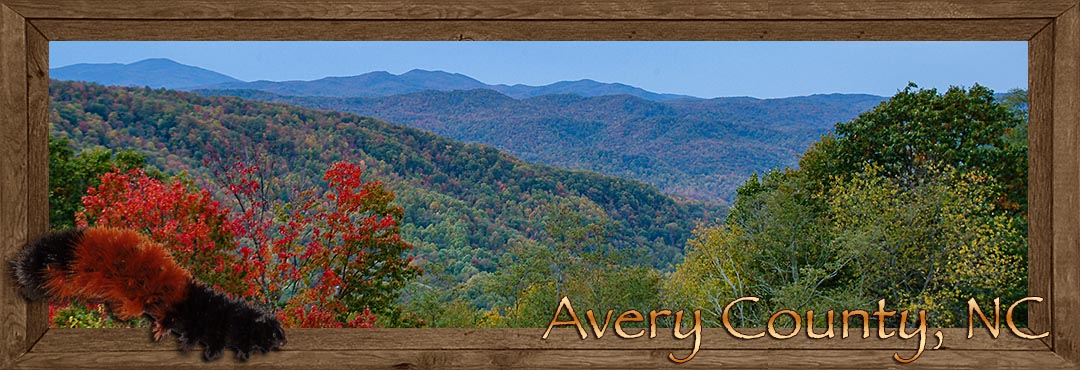Avery County North Carolina
Home to Grandfather Mountain and Linville Gorge State Park
Avery County, North Carolina stands behind its claim as the highest county in the eastern United States with a county capital seat at an elevation of 3,621 feet above sea level. It also has the highest incorporated town in the eastern United States atop of Beech Mountain, elevation 5,506 feet and is the Christmas Tree Capital of the world. These three big claims are only a taste of the wonders, sights and recreations Avery County has to offer.
Cradled between the mountain top border of Tennessee to the north and the winding marvel of modern engineering to the south, the renowned Blue Ridge Parkway, Avery County is by far one of the most unique geographical locations in North Carolina’s Blue Ridge Mountains.
Founded in 1911, Avery County is the youngest county in North Carolina being the 100th and last county formed in the state. The irony of being the youngest county is that Avery county lies beneath the colossal shadow of the famed Grandfather Mountain which is 620 million years old. Avery County is a land of majestic beauty, natural wonders and outdoors adventure offering a 1st class, top of the mountain, leisure lifestyle.
 You’ll find exquisite dining with fine wines to campgrounds with open cook fires, quiet strolls in community parks to backcountry hiking. You can enjoy the rush of wild white water rafting trips as well as the windswept snow covered ski slopes of the High Country, Avery County has all the mountain pleasures you can hope for and so much more.
You’ll find exquisite dining with fine wines to campgrounds with open cook fires, quiet strolls in community parks to backcountry hiking. You can enjoy the rush of wild white water rafting trips as well as the windswept snow covered ski slopes of the High Country, Avery County has all the mountain pleasures you can hope for and so much more.
Aside from the obvious mountain beauty of Avery County, you’ll find a well-joined community spirit that reigns throughout these high mountains and deep valleys. What’s most impressive about Avery County are the numerous towns located in and around the county and its borders, all highly active and service orientated.
A good way to describe the lifestyle of Avery County is to call it up-scale; every town seems to be competing for a “Best of Town” award. Here in this isolated part of the Blue Ridge Mountains you won’t feel very far from the comfort of home. The county seems to consist of established communities of “old money,” and ever-growing community developments for the “Nouveau Riche.” Yet the richness of the county doesn’t truly lie in the pocket but in the surrounding natural and man-made wonders within this Blue Ridge Mountain cathedral.
Before we delve into all that Avery County has to offer its only polite to look back into the early days of the county, a historical backdrop that will show just how far the county has come.
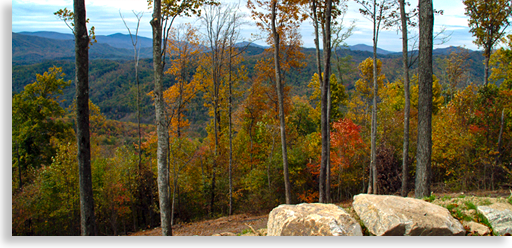
Historical Avery County
Founded in the 1911 and created out of portions of Mitchell and Watauga counties, Avery County can be considered the new kid on the block sharing a long history with its old friends, the neighboring counties.
The county seat is located in the town of Newland named in honor of the Honorable W.C. Newland of Lenoir who was at the time the lieutenant governor of North Carolina. The location of the county seat was once known as Old Fields of Toe. This location was allotted by a former land grant in 1783 to Colonel Waightstill Avery in which Avery County receives it namesake.
Activity by white traders, trappers and settlers began here before the French and Indian War when colonialist set out for new horizons, leasing lands from or obtaining through treaties with the local Native Americans. Dating back to 1729, the region of Avery County has had 13 aliases beginning with Clarendon, New Hanover, Bladen, Anson, Rowan, Surry, Burke, Wilkes, Ashe, Yancey, Caldwell, Watauga and Mitchell. The county was also considered part of the unofficial “State of Franklin,” that sought independence through the leadership of John Sevier.
Trail blazing pioneers and heroic Revolutionary war heroes have found themselves living in the region. Daniel Boone was one well-known historical character, and then there were the Sevier brothers, John and Robert who were renowned heroes of the Battle of Kings Mountain. The Battle of Kings Mountain was a decisive battle that changed the tide of the Revolutionary war in favor of the colonialist. John Sevier (1745-1815) went on to be the first governor of Tennessee and brother Robert (1749-1780) was wounded and died en-route home and is buried in present day Avery County. These brave Revolutionary warriors and hundreds more were known as the Overmountain Men, settlers who lived in the mountain regions bordering North Carolina and Tennessee. One notable character from this period that is buried in Avery County was Corporal Davis who lived to be between 114 to 116 years old; those are nearly biblical numbers considering the life expectancy of people in the 18th century or even the early 21st century for that matter.
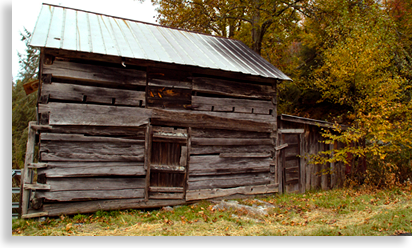 If you like digging and rooting thru history the Avery County Historical Museum is the place to start shoveling for information. The museum was established in 1976 and is housed in historic and former Avery County Jail constructed in 1912 when the courthouse was being built.
If you like digging and rooting thru history the Avery County Historical Museum is the place to start shoveling for information. The museum was established in 1976 and is housed in historic and former Avery County Jail constructed in 1912 when the courthouse was being built.
Historical sites lie throughout the county if you’re an architectural buff of the mid-18th thru the early 20th century; one structure in particular dating back to the 1780’s is the Burleson Cabin. Other historical sites are the popular and renowned Lees-McRae College and Crossnore School.
Lees-McRae College is a grand old school located in the town of Banner Elk. Founded in 1900 by Reverend Edgar Tufts, the name Lees-McRae Institute didn’t take hold until 1907. The name McRae is derived from one the schools earliest and most dedicated teacher Elizabeth A. McRae. During these early times the school found its financial support through the generous benefactor Mrs. Mrs. S. P. Lees of Kentucky and New York unifying the two names Lees-McRae.
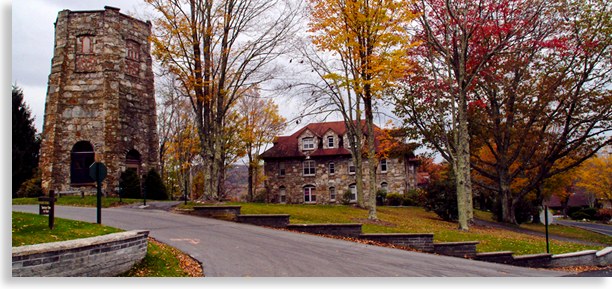 The building structures of this beautiful mountain campus are composed of stone masonry quarried from local sites. Also located on the campus is the exciting new Hayes Auditorium for the performing arts, this most recent addition enhances the growing pride of this high county community. A stroll along the campus grounds of Lees-McRae College is pleasurable way to cap off a fine meal considering the college is located in downtown Banner Elk, adding to the accentuated atmosphere of charm, culture and sophistication to this mountain town. One distinct and note worthy feature on the campus is the large stone tower, standing as a beckon of strength and endurance of the unique college.
The building structures of this beautiful mountain campus are composed of stone masonry quarried from local sites. Also located on the campus is the exciting new Hayes Auditorium for the performing arts, this most recent addition enhances the growing pride of this high county community. A stroll along the campus grounds of Lees-McRae College is pleasurable way to cap off a fine meal considering the college is located in downtown Banner Elk, adding to the accentuated atmosphere of charm, culture and sophistication to this mountain town. One distinct and note worthy feature on the campus is the large stone tower, standing as a beckon of strength and endurance of the unique college.
Up the road in the town of Crossnore is the Crossnore School. Doctors Eustace and Mary Martin Sloop founded the school in 1913 as a way of bettering the lives of local Avery County children. This was a period in Avery County when poverty and lack of education ruled the minds of the local residents. What the Sloops did for these children was to build a school, hospital and dental clinic for these deprived and often neglected or abused children, offering local kids an opportunity to break away from the past. Children who have been orphaned have also found sanctuary here at Crossnore School and still do today; some 27 counties in North Carolina have provided some of the students who reside full time on the school grounds.
The Sloops not only are credited for contributing to the success at Crossnore School, you will also find they were the first to bring electricity, the telephone and the first paved road to Avery County.
More than just a school you’ll find a weaving room and other mountain crafts available for sale at the school, the Blair Fraley Thrift Store provides income that goes directly towards operating the school. There’s also a new coffee shop on the grounds and you know how we all enjoy a good latte.
Lees-McRae College and Crossnore School are exceptional accomplishments when you considered that when these schools were started this was still a remote and isolated mountain community at the turn of the 20th century, unlike today with all the wealth and progress gleaming around Avery County.
History is a wonderful way to examine how an area has developed yet it’s the natural beauty, culture, festivals, outdoor adventure and winter recreations that draw the large number of visitors to Avery County throughout the year. “Avery County never closes,” should this mountain region’s personal motto.


Springtime awakens Mother Nature with its vast array of wild flowers, bird migration and hungry trout streams. Whitewater rafting seasons begins each spring thrilling guests with exciting river runs while hiking trail’s traffic increase with daily hikers experiencing the new birth of budding trees, avenues of wildflowers and the delectable fragrance of fresh mountain air.
Spring weather assures scenic driving enthusiast access to the world famous Blue Ridge Parkway offering spectacular views of Linville Gorge, Grandfather Mountain and the countless vista of towering mountain ranges.

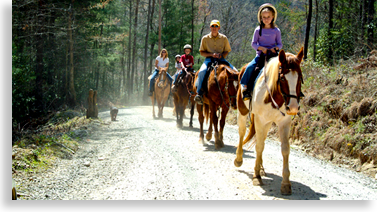
Summer welcomes visitors with festivals, events and other activities that call the masses of mountain lovers into the fringes and depths of the mountain interiors. Outdoor excitement offers hiking, biking, climbing, horseback riding, backpacking, fly-fishing, rafting, canoeing, camping and caving.
Fall colors cry out to the leaf watchers who flock to Avery County to witness the exhibits of palette and brush against the mountain slopes and across the valley floors with vibrating colors that captures the senses. Festivals and events like the Wooly Worm Festival fill the towns every fall season, overflowing into the community parks and countryside meadows throughout the county. Autumn provides the wares of the harvest in Avery County with fresh fruits and vegetables ripe from the fields, conveniently located at roadside stands. Winter keeps the action moving with high country activities along snow-covered slopes, including down hill skiing, snow-boarding, snow-tubing, sledding and cross country skiing. Three ski resorts are located in Avery County, with elevations reaching up to 5, 506 feet above sea level, the highest ski slopes east of the Rockies.The winter season often transports the entire county into a winter wonderland. Due to occasional heavy snows the Blue Ridge Parkway is often closed in the winter months, but tell that to the dedicated cross county skiers who glide along the parkway’s curves and inclines. The wintertime views along the Parkway make this a most unique experience and a “ski at your own risk experience,” no ski patrol I would imagine.
Vast forests of private owned Christmas tree farms add to the holiday mystic of Avery County making Christmas a truly special time of the year.
It’s the beauty and wonders of Avery County that welcomes visitors and seasonal residents to the “High Country,” as it’s beloved namesake is known; yet it’s the local towns and communities that hold the very heart of Avery County.
Towns and Communities
 Newland:Incorporated in 1911 as the county seat, the town of Newland is considered the highest county seat east of the Mississippi River. The traditional styled Avery County Courthouse was constructed in 1913 and is located across from the town square. The jail-house was also constructed in 1913 and is now home to the Avery County Historical Museum. The original jail cells are still present along with exhibits of historical artifacts, photographs and documents. This modest town of roughly 700 residents maintains the charm reflected in a community that focuses on official matters and business. Local parks shops and eateries offer an atmosphere of small town lifestyle with local architecture dating back over 100 years.
Newland:Incorporated in 1911 as the county seat, the town of Newland is considered the highest county seat east of the Mississippi River. The traditional styled Avery County Courthouse was constructed in 1913 and is located across from the town square. The jail-house was also constructed in 1913 and is now home to the Avery County Historical Museum. The original jail cells are still present along with exhibits of historical artifacts, photographs and documents. This modest town of roughly 700 residents maintains the charm reflected in a community that focuses on official matters and business. Local parks shops and eateries offer an atmosphere of small town lifestyle with local architecture dating back over 100 years.
Banner Elk is also a college town, home to Lees-McRae College giving a unique edge of character to this to this popular and ever-growing community. The college’s newly constructed Hayes Auditorium is host to the performing arts.
With causal to fine dining, specialty shops and lodging, Banner Elk stands as a symbol of continual success that is so ever present throughout Avery County.
 Banner Elk is also the home of the “Wooly Worm Festival” held each October at the elementary school just behind the elk monument. The festival offers music, dancing and family fun and a competition race where entries either bring their own hand trained wooly worms or purchase a potential champion worm at the festival. The lanes on the race board are made of 3-foot-long pieces of string strung between a nail at the top and a nail at the bottom. The worms climb the string. Entrants are motivated along by their pit crew who closely blow on the wooly ones to motive their speedy ascent. The first Wooly Worm to the top wins. Punxsutawney Phil, (and yes I spelled it right) the ground hog may forecast the coming of spring up north, yet it’s this little brown and black rascal of 13 stripes…the wooly worm of soothsayers and sorcerers that predicts the winter season to come for Avery County and these mountainous regions of North Carolina.
Banner Elk is also the home of the “Wooly Worm Festival” held each October at the elementary school just behind the elk monument. The festival offers music, dancing and family fun and a competition race where entries either bring their own hand trained wooly worms or purchase a potential champion worm at the festival. The lanes on the race board are made of 3-foot-long pieces of string strung between a nail at the top and a nail at the bottom. The worms climb the string. Entrants are motivated along by their pit crew who closely blow on the wooly ones to motive their speedy ascent. The first Wooly Worm to the top wins. Punxsutawney Phil, (and yes I spelled it right) the ground hog may forecast the coming of spring up north, yet it’s this little brown and black rascal of 13 stripes…the wooly worm of soothsayers and sorcerers that predicts the winter season to come for Avery County and these mountainous regions of North Carolina.
Sugar Mountain: Known as the Village of Sugar Mountain, is a delightful community just below Sugar Mountain. The term village makes me tend to believe the town was developed much later in Avery County due to the local ski resort on Sugar Mountain. This growing community located between Banner Elk and the town of Grandfather has a charm and style all its own with shops, restaurants and lodging. Trails from the Village of Sugar Mountain wind up the slopes of this big candy named mountain; or better yet, the ski lift on Sugar Mountain, which run year round when weather permits. Either route takes visitors to the top of the Sugar Mountain from which you can witness views of Avery County; you can also drive up to the top of Sugar Mountain, any route will lead to a worthwhile experience.
Beech Mountain: Considered the highest incorporated town east of the Rocky Mountains at a elevation at 5,506 feet above sea level, Beech Mountain is a ski resort town engulfed in a maze of ski slopes and seasonal residential neighborhoods, all clinging to the sides of Beech Mountain. Technically only the western edge of Beech Mountain is in Avery County, its close proximity to Banner Elk makes visitors feel as though they never left the county. Shops, causal and fine dining and an abundance of lodging along with popular winter sports draw visitors to this unique community in the High Country.
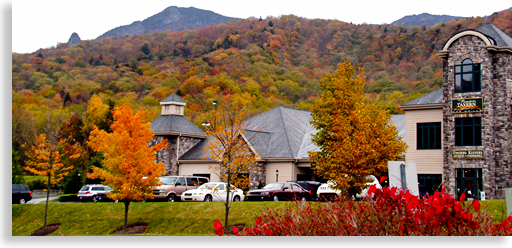 Throughout Avery County are numerous towns and community that are in a state of continual growth and expansion such as the towns of Linville and Grandfather, with commercial growth supplying the needs of yearly visitors and year round residents. Avery County towns and communities like Crossnore, Elk Park, Ingalls, Plumtree, Heaton, Pineola, Minneapolis, Roaring Gap and others are progressing while still residing in a rural setting within a land of beauty that is incomparable to the world outside the great Blue Ridge Mountains.
Throughout Avery County are numerous towns and community that are in a state of continual growth and expansion such as the towns of Linville and Grandfather, with commercial growth supplying the needs of yearly visitors and year round residents. Avery County towns and communities like Crossnore, Elk Park, Ingalls, Plumtree, Heaton, Pineola, Minneapolis, Roaring Gap and others are progressing while still residing in a rural setting within a land of beauty that is incomparable to the world outside the great Blue Ridge Mountains.
Southern hospitality and friendly folks ring throughout the land welcoming visitors and seasonal residents back again and again with festivals, events and entertainment to its backyard of indescribable beauty.
Avery County North Carolina Festivals and Events
Many festivals and events go on throughout the four-seasons in Avery County drawing thousands of fun seekers. Two of the most popular are the Highland Games and the Wooly Worm Festival.
The annual Highland Games have been held in the meadows below Grandfather Mountain since 1956. This authentic Scottish Highlander event is considered the largest clan gathering in the world with 130 clans showing their tartan colors and customs to 30,000 guest each year. This four-day-long festival of music, dancing and food along with competitions in strength, skills and craftsmanship entertain local and annual visitors to Avery County. Pipes and drums blare the sounds of the highlands with drum majors leading the parades. If you have a kilt (or not) and love the Scottish heritage this is an event you’ll want to attend. With Grandfather Mountain rising high above the meadows there’s no place on earth more suitable for this colorful event. The Wooly Worm Festival has been held in Banner Elk each October since 1973. An average of 25,000 people visit the festival each year for music, fun, food, games and excitement. The traditional purpose of the festival is the mystical wooly worm, a weather forecasting caterpillar whose black and brown stripes might determine the winter to come. The honorary wooly worm selected for this event is determined by a race up a vertical wall. Hundreds of event visitors enter the race buy either bringing their own wooly worm athlete or purchasing rookie wooly critters at the event. It’s the atmosphere and excitement of this event that sets the charge of joy and fun in the air in the mountain town of Banner Elk.
The Wooly Worm Festival has been held in Banner Elk each October since 1973. An average of 25,000 people visit the festival each year for music, fun, food, games and excitement. The traditional purpose of the festival is the mystical wooly worm, a weather forecasting caterpillar whose black and brown stripes might determine the winter to come. The honorary wooly worm selected for this event is determined by a race up a vertical wall. Hundreds of event visitors enter the race buy either bringing their own wooly worm athlete or purchasing rookie wooly critters at the event. It’s the atmosphere and excitement of this event that sets the charge of joy and fun in the air in the mountain town of Banner Elk.
Other festivals and events that are held in and around Avery County are available on the Blue Ridge Highlander’s website’s Calendar of Events; make sure to attend these events when you visit Avery County.
High Country North Carolina
The Blue Ridge Highlander saved this section for the latter part of the Avery County profile for personal sentimental reasons. Wealth may lie across the valleys, slopes and ridges of the county, yet it’s the natural beauty and wonders surrounding Avery County that are the true priceless riches of the High Country.
Linville Gorge and Falls, Linville Caverns, the Blue Ridge Parkway, Grandfather Mountain, Pisgah National Forest, the Elk and Watauga Rivers along with numerous other waterways throughout the county set the pace and draw the visitors to this “High Country” region. Those who come to Avery County for the first time, come back time and time and again. Others came, fell in love and decided to stay thinking they have finally found what they were searching for, a lifestyle of luxury, leisure and outdoor adventure. Below is a list of special outdoor features and locations you’ll want to visit and enjoy during your stay in Avery County.
Linville Falls Gorge: Linville Falls Gorge is located along the southern edge of Avery County. To reach the falls and gorge take U.S. 221 to where U.S. 221 and the Blue Ridge Parkway cross, a small tourist town of Linville Falls is located near the park entrance. Linville Falls Recreation Area is owned and operated by the National Park Service who received it as a donation from John D. Rockefeller in 1952. The falls are named after William Linville; William and his son explored this region on a hunting expedition in 1766; unfortunately they were attacked by a group of Cherokees. William was killed and his son went missing, possibly captured and sold in slavery, a common practice with Native Americans at the time.
 If you’re on the Parkway, Linville Falls Gorge and Wilderness Area is located towards the south off parkway milepost 316.5. From the visitors center at Linville Falls Recreation Center there are four trails leading to the gorge waterfalls. The most popular trail is the Erwins View Trail also known as the Linville Falls Trail. The first overview you’ll encounter of the falls will take you to the very top of the main waterfall. Next to the trail you’ll find large rock formations and boulders that will take you right to the upper ledge of the big falls and river bank, a smaller set of waterfalls along the river to the north can also be seen from this location. Always be careful around waterfalls. Note, wherever water flows over rocks near the riverbank is very slippery and dangerous, please exercise caution.
If you’re on the Parkway, Linville Falls Gorge and Wilderness Area is located towards the south off parkway milepost 316.5. From the visitors center at Linville Falls Recreation Center there are four trails leading to the gorge waterfalls. The most popular trail is the Erwins View Trail also known as the Linville Falls Trail. The first overview you’ll encounter of the falls will take you to the very top of the main waterfall. Next to the trail you’ll find large rock formations and boulders that will take you right to the upper ledge of the big falls and river bank, a smaller set of waterfalls along the river to the north can also be seen from this location. Always be careful around waterfalls. Note, wherever water flows over rocks near the riverbank is very slippery and dangerous, please exercise caution.
A third overlook at the end of the trail offers a view of the gorge below to the south. There are also other trails on the opposite side of Linville Falls and River so wear comfortable sturdy walking shoes if you plan to hike both sides of the river. The Erwin’s Trail (Linville Falls Trail) is a moderate hike whereas the trails on the opposite side will take you to the bottom of the falls and you will be sucking wind coming back up that trail.
This scenic recreation area is a must see with heavy foot traffic during spring and summer holidays. The autumn season draws the biggest crowds so plan on smiling and saying, “hi” a lot. I always find it interesting to ask where visitors are from, and they’re always happy to tell you.
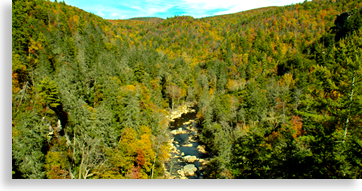 Linville Gorge and Linville Gorge Wilderness Area: Designed to preserve the environment, this wilderness is meant for serious backpacker and hikers. The 10,975-acre preserve encompass the entire Linville River Gorge, which runs south and away from Avery County. The Linville River finds its headwaters atop Grandfather Mountain, carving a deep cut between two mountains it remains as primitive as it has ever been. This area is for the real die-hard outdoor enthusiast. Casual sightseers can view the river gorge’s wilderness from the Parkway at milepost 316.5 or the chimney overlooks near the falls. Check in with local National Forest centers for further information before entering any wilderness area.
Linville Gorge and Linville Gorge Wilderness Area: Designed to preserve the environment, this wilderness is meant for serious backpacker and hikers. The 10,975-acre preserve encompass the entire Linville River Gorge, which runs south and away from Avery County. The Linville River finds its headwaters atop Grandfather Mountain, carving a deep cut between two mountains it remains as primitive as it has ever been. This area is for the real die-hard outdoor enthusiast. Casual sightseers can view the river gorge’s wilderness from the Parkway at milepost 316.5 or the chimney overlooks near the falls. Check in with local National Forest centers for further information before entering any wilderness area.
Linville Caverns: If you’ve been to the top of the falls and the bottom of the falls now it’s time to journey down under the falls or rather near the region of the falls. The entrance to Linville Caverns is located along U.S. 221 near Linville Falls and if you have never had a chance to visit a cave but found the idea intriguing you’re in for a treat. If you’re are a true blue get down, get dirty, get wet, crawl on your belly thru subterranean holes wearing a little light strapped to your safety helmet; kind of caver that’s great, but not necessary to enjoy Linville Caverns. You can wear your good traveling clothes; you’re not going to get dirty here. Linville Caverns is a first class tour guided caving experience for all ages, with underworld wonders that will amaze you.
The guided tours thru this cavern is all you’ve come to expect in a commercial caving experience; stalagmites, stalactites, gem stones, cathedral chambers, underground waterways and unusual rock formations, that subliminally say. “You know what that looks like?” or “you know who that looks like!” will keep you guessing along the tour.
It’s 52-degrees in the cavern year round, so plan to bring a light jacket to keep you cozy. This is a fun and educational experience, a natural wonder carved along the march of time. I’ve never been to one of these caverns throughout the south where I didn’t experience a least one tight passage referred to as “fat man’s squeeze of misery.” So gentlemen, eat lightly before coming and save the big meal for later, you might have to suck in your gut; and ladies with all due respect, “trying on” that tight squeeze between the rock walls might make your bottom feel big.
There are too many features to mention along this journey to the center of the earth tour. This is one natural wonder you’ll want to experience and enjoy for yourself.
Blue Ridge Parkway: You know your county has been blessed when it has within its boundaries a section of the Blue Ridge Parkway. I can never say enough or get enough of the Parkway. This 469-mile highway which found its beginning in 1935 is a man made wonder flowing ever so peacefully along the ridges and peaks of the Blue Ridge Mountains.

The Parkway begins in Virginia at milepost-0 and completes its journey in Cherokee, North Carolina at the southern entrance of the Great Smoky Mountain National Park at milepost-469. Yet it was here along the southern slopes of Grandfather Mountain in Avery County that the Parkway established its final section of highway. It seems that the “Old Man of the Mountain,” Hugh Morton of the Grandfather Mountain fame, went to battle with the constructor of the Parkway for 20-years, insisting that preservation to this monument of a mountain (Grandfather Mountain) be maintained. The results of this stubborn and persistent protector of the High Country caused the constructors of the Parkway to build an elevated bridge that spans 7.5-miles around the perimeter of Grandfather Mountain. Linn Cove Viaduct at milepost-304 is an engineering feat that has become renowned throughout all the Blue Ridge Mountains.
Other Blue Ridge Parkway overlooks along this section boarding Avery County are Grandfather Mountain at milepost-298-305, Pisgah National Forest milepost-308-355, Lost Cove Cliffs milepost-310 and Linville Falls milepost-316. The Blue Ridge Parkway is open throughout spring, summer and fall. Winter weather determines whether the Parkway is open to traffic. You can always ski the Blue Ridge Parkway when snows are heavy but do it with caution. Never take bad weather for granted during times of snow and ice in the mountains, gravity rules and it’s not a very forgiving master.
Grandfather Mountain: This ancient mountain of the Blue Ridge Mountain Province is probably the most legendary. Its owner and developer Hugh Morton has a reputation that lives on past his recent death in June 2006 at the age of 85. This naturalist, mountain zoologist, botanist, accomplished photographer and devoted county citizen has had an ongoing love affair with Grandfather Mountain and rightfully so.
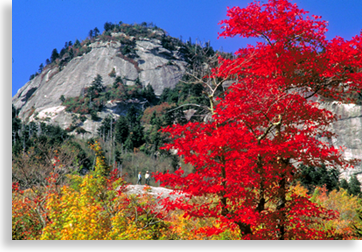 Mr. Morton inherited the 4,000-acre mountain in 1952 from his grandfather and began a 54-year odyssey that took Grandfather Mountain’s fame to a greater notoriety making this ancient rock protruding from the earth’s surface a worldwide public attraction and natural historical landmark. What’s most significant about Grandfather Mountain is its geological history along its distinctly unique rock formations, which displays a natural and rugged beauty unlike any other mountain range in the Blue Ridge Mountains.
Mr. Morton inherited the 4,000-acre mountain in 1952 from his grandfather and began a 54-year odyssey that took Grandfather Mountain’s fame to a greater notoriety making this ancient rock protruding from the earth’s surface a worldwide public attraction and natural historical landmark. What’s most significant about Grandfather Mountain is its geological history along its distinctly unique rock formations, which displays a natural and rugged beauty unlike any other mountain range in the Blue Ridge Mountains.
Before you begin your personal exploration of this 4,000 acre private reserve opened daily to the public, I would like to note for your greater understanding that Grandfather Mountain is only one mountain with 6 peaks. The Grandfather Mountain window is a geologic feature where younger rock has eroded away and older rock is exposed. The window measures approximately 45 miles long and 20 miles wide and runs from Linville Falls to Blowing Rock. This geographical wonder runs along the Blue Ridge Parkway in the upper North Carolina’s Blue Ridge Mountains.
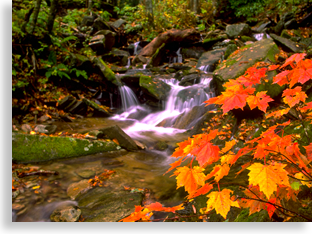 The Grandfather Mountain in Avery County is visibly the most uniquely characteristic mountain in the Blue Ridge Province and that says a lot when you compare all of the other great mountains in the region. The huge bare rock formations along its ridge, seen from a distance appear against the horizon as a giant sleeping camel. That is if a camel had no head, three humps and was 4,000-acres large. So incredibly unique is Grandfather Mountain that in 1994 the United Nations designated this 4,000-acre park to its international network list of Biosphere Reserves and it is the only privately owned biosphere out of 337 in 85 counties. There are 507 biospheres in 102 countries.
The Grandfather Mountain in Avery County is visibly the most uniquely characteristic mountain in the Blue Ridge Province and that says a lot when you compare all of the other great mountains in the region. The huge bare rock formations along its ridge, seen from a distance appear against the horizon as a giant sleeping camel. That is if a camel had no head, three humps and was 4,000-acres large. So incredibly unique is Grandfather Mountain that in 1994 the United Nations designated this 4,000-acre park to its international network list of Biosphere Reserves and it is the only privately owned biosphere out of 337 in 85 counties. There are 507 biospheres in 102 countries.
Geologists believe that this ancient mountain was once 10 times taller, worn down by time and erosion. They also believe this range is older than the Rockies, Alps and Himalayas. Today this giant testament to time stands at an eastern United States mountain height of 5,964 feet above sea level. The short journey up Grandfather Mountain is equivalent to as many different climate zones changes as a drive from North Carolina to Newfoundland. This mountain is referred to, as the Grandfather Mountain Window in reference to how we are actually looking into a mountain whose concealed interior base is visible today, exposed by time and water erosion. Some of these gigantic natural rock formations have names like Linville Bluffs and Split Rock.
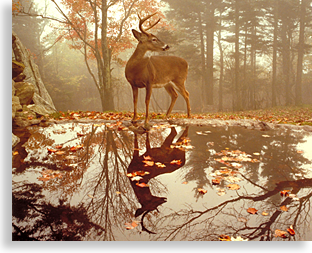 Fauna and flora abound on Grandfather Mountain’s wildlife preserve drawing worldwide visitors to this great highland attraction. The photos depicted in this section of the Highlander’s profile of Grandfather Mountain were provided by Grandfather Mountain, from Mr. Hugh Morton’s own personal collection.
Fauna and flora abound on Grandfather Mountain’s wildlife preserve drawing worldwide visitors to this great highland attraction. The photos depicted in this section of the Highlander’s profile of Grandfather Mountain were provided by Grandfather Mountain, from Mr. Hugh Morton’s own personal collection.
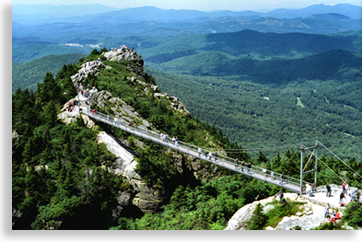 The road from the gatehouse into the park leads up the slope passing many overlooks along the way. Seven wildlife habitats are available for wildlife viewing as well and other critters that naturally roam the mountainside. Along the drive up the mountain you’ll come to the Nature Museum, continuing further upward picnic areas, hiking trails and breath taking scenery will keep your heart pounding with amazement.
The road from the gatehouse into the park leads up the slope passing many overlooks along the way. Seven wildlife habitats are available for wildlife viewing as well and other critters that naturally roam the mountainside. Along the drive up the mountain you’ll come to the Nature Museum, continuing further upward picnic areas, hiking trails and breath taking scenery will keep your heart pounding with amazement.
Nearing the top of the mountain you’ll reach the Visitor’s Center and from there you’ll go a short distance on foot to the Mile High Suspension Bridge, one of the highest swinging bridges in North America. From the bridge the views are indescribable; the long narrow suspended platform across the bridge offers a sense of floating on air when viewing the majestic Blue Ridge Mountains. At the other end of the bridge are more trails to explore, and more outcroppings of mammoth rocks for you to marvel at on Grandfather Mountain. Plan a full day; pack a picnic lunch you’ll be glad you came.
Rivers and Waterways: Trout fishing, fly-fishing, white water rafting, kayaking, funyaking, tubing and canoeing are going to get you wet and put a thrill in your day.
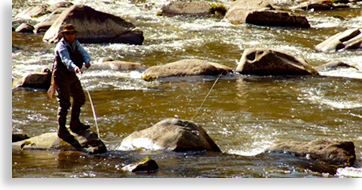 The creeks and streams of Avery County are very popular for fishing here in the High Country. The numerous waterways throughout this great mountain watershed offer an array of fresh water fish that will keep you reeling in the big ones all day.
The creeks and streams of Avery County are very popular for fishing here in the High Country. The numerous waterways throughout this great mountain watershed offer an array of fresh water fish that will keep you reeling in the big ones all day.
You’ll want to inquire at the Forestry Ranger Station as to where to find the perfect venue to suit your particular style of line and hook for your own personal fishing expedition in the High County of Avery County.
White water thrills on the Elk and Watauga Rivers await those looking for adventure. Local outfitters and rafting companies offer guided rafting trips or smaller river flotation devises for those looking to set out on their own, catching the surge and riding the high rapids on the wilds of white water rivers.
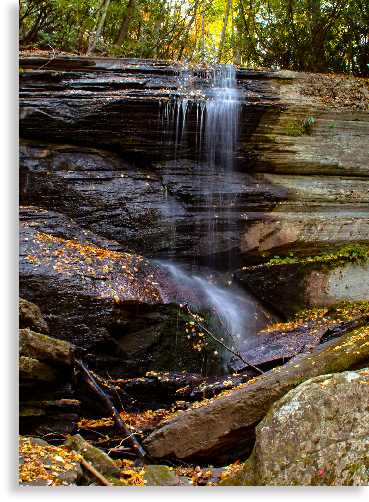 Waterfalls: Waterfalls and High County go together like syrup over a stack of pancakes. Mountains mean watersheds and watersheds create an abundance of waterfalls all over Avery County. Ventures into secluded forest interiors in search of mysterious waterfalls take visitors into the beauty of the Pisgah National Forest to such waterfalls as Linville Falls in Linville Gorge. The extraordinary wonders of these mountain watersheds make Avery County rich in natural display of waterfalls that also lie throughout the local countryside as well as on private property, such as the waterfall pictured here at the Headwaters development just north of Banner Elk.
Waterfalls: Waterfalls and High County go together like syrup over a stack of pancakes. Mountains mean watersheds and watersheds create an abundance of waterfalls all over Avery County. Ventures into secluded forest interiors in search of mysterious waterfalls take visitors into the beauty of the Pisgah National Forest to such waterfalls as Linville Falls in Linville Gorge. The extraordinary wonders of these mountain watersheds make Avery County rich in natural display of waterfalls that also lie throughout the local countryside as well as on private property, such as the waterfall pictured here at the Headwaters development just north of Banner Elk.
One of the most popular waterfalls is Elk Falls near the town of Elk Park in northern Avery County. The falls are a part of the Elk River that’s located on a small tract of the Pisgah National Forest. Elk Falls are 50-feet tall, plunging over a sheer cliff and settling into the largest and deepest pool in North Carolina. A short 1/4-mile trail from the picnic and parking area makes the waterfall easy to access. Many other waterfalls in the area are fairly accessible; pick up a brochure at the local forestry office for directions.
 Lake Watauga: For those looking to cruise the open waters and gaze upon a mountain backdrop there’s Lake Watauga, located just over the North Carolina and Tennessee state line and less than an hours drive from the center of Avery County.
Lake Watauga: For those looking to cruise the open waters and gaze upon a mountain backdrop there’s Lake Watauga, located just over the North Carolina and Tennessee state line and less than an hours drive from the center of Avery County.
Considering the origins of the headwaters of Lake Watauga are located in Avery County; those being the Elk and Watauga, makes Lake Watauga feel like you never left the confines of Avery County. With 34,200-acres of lake surface water and 104-miles of shoreline, the mountain water fed lake offers a whole lot of fun for you fresh water land lovers. Power boating, sailing, swimming, water skiing and bass fishing, plus camping, hiking, biking and picnicking provide water and shore line recreation.
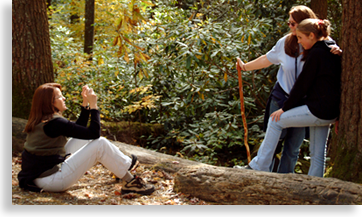 Rock Climbing, Hiking, Biking and Backpacking: These outdoor adventures are a great way to experience Avery County’s wild country. The abundance of sheer rock outcroppings offers challenges for both beginners as well as experienced climbers. The Grandfather Mountain Window has exposed these naturally sculptured monoliths for the average armrest viewer to witness during their scenic drives, yet rock climbers see these big boys as something needing to be conquered.
Rock Climbing, Hiking, Biking and Backpacking: These outdoor adventures are a great way to experience Avery County’s wild country. The abundance of sheer rock outcroppings offers challenges for both beginners as well as experienced climbers. The Grandfather Mountain Window has exposed these naturally sculptured monoliths for the average armrest viewer to witness during their scenic drives, yet rock climbers see these big boys as something needing to be conquered.
The miles and miles of wilderness trails throughout Avery County and the Pisgah National Forest take wilderness buffs into the backcountry where they can figuratively get lost in a world unlike their own (always use and stay on well marked trails and travel with companions.) The best and safest way to get the most out of these high country wilderness expeditions is to consult the local Forest Rangers for locations and special advice. They’re the ones who have to go get you if you don’t come back on schedule.
 Golf: The High Country is legendary home of the Highland Games. These Scottish son and daughters, descendants of the Old World wouldn’t dare not have golf courses available, it would be blasphemy not to utter the loud Scottish cry, “fore!” Throughout Avery County are some of the finest golf courses in the High Country, both private and public. These courses provide those tormented “tortures of the tee,” a place to challenge the fairways, and curse that pesky set clubs they so dearly love. In my humble opinion the only reason golf courses have clubhouse is to dispense spirits to the withered, humbled and broken hearted. There they may sit back, take courage and try to explain the big one that got away from them.
Golf: The High Country is legendary home of the Highland Games. These Scottish son and daughters, descendants of the Old World wouldn’t dare not have golf courses available, it would be blasphemy not to utter the loud Scottish cry, “fore!” Throughout Avery County are some of the finest golf courses in the High Country, both private and public. These courses provide those tormented “tortures of the tee,” a place to challenge the fairways, and curse that pesky set clubs they so dearly love. In my humble opinion the only reason golf courses have clubhouse is to dispense spirits to the withered, humbled and broken hearted. There they may sit back, take courage and try to explain the big one that got away from them.
Two other popular scenic drives in the county are U.S. 221 and N. C. 194; don’t forget to bring your camera and pack a lunch or pick up a carryout meal to take along on your journey. Taking a lunch break from your scenic drive at a quiet picnic area will help relax that mountain road grip on your steering wheel. You’re also going to want to stop along the way for an occasional short hike to observe some hidden gem or out of the way historical site located near the road.
Skiing in the High Country: It’s as though the county never sleeps with one season flowing into next throughout the year. Numerous ski resorts in and around Avery County offer some of the highest downhill slopes in the eastern United States. Skiing, snow boarding, tubing and cross-country skiing draw winter outdoor enthusiast to the High Country. An abundance of lodging accommodations awaits you in the land of southern snowfields. The week between Christmas and New Year’s draw the most visitors to the high slopes; so make your reservations early.

It’s only natural that this land of winter wonderland is also the Christmas Tree Capital of the World. If you plan a ski trip between Thanksgiving and Christmas plan on taking a Christmas Tree home with you. Some tree farms offer winter hayrides thru the miles of tree corridors so you can make you own personal holiday pick. Paul Bunyan never had it so good.
Avery County has so much to offer one visit just won’t do. Outdoor adventure, shopping, great dining, lodging along with festivals, events, performing arts, mountain crafts and friendly folks make Avery County a great vacation and holiday place to visit. Seasonal and year round residents of Avery County proudly proclaim, “there’s no place like home,” come home to Avery County, where you are welcomed the year round.

The Blue Ridge Highlander logo, all photography, design, graphics, artwork, writing, digital images, etc are the Copyright © of C. Wayne Dukes and Sherry Bell Dukes, 1996 to current day, except where otherwise stated. All rights reserved, reproduction, downloading, and/or duplication of any sort is strictly prohibited, all violations will be prosecuted. Legal Policy. If you have any questions, or comments, regarding this site, e-mail the Highlander.
 Menu
Menu